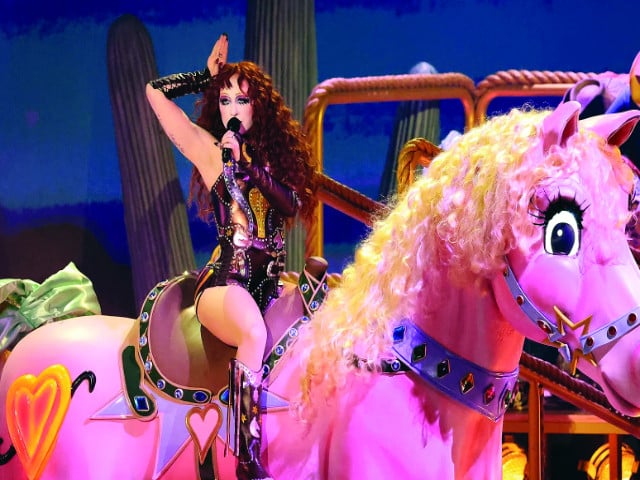SLOUGH, ENGLAND:
Sunday night was a big night for Chappell Roan. Not only did this pink-pony-loving young woman walk away with a best new artist Grammy award, she also managed to deliver a rather glorious dressing down to record companies at a time when none could pretend to have missed her message: that it is time for them to revisit how they treat young stars.
Calling a spade a spade
Roan is one of the few who was able to actualise a childhood dream of becoming a star – not that it was a completely pitfall-free journey. “I got signed so young, I got signed as a minor,” she told her audience. “When I got dropped, I had zero job experience under my belt, and like most people, I had quite a difficult time finding a job in the pandemic and [could not] afford insurance.”
As Variety reminds us, Roan, who is 26, started her career as a teenager, uploading songs to YouTube under the name Kayleigh Rose. She was signed by Atlantic Records in 2015, but the label dropped her in 2020. In 2023, Roan signed with Dan Nigro’s independent imprint Amusement Records, and she released her debut album The Rise and Fall of a Midwest Princess in partnership with Island Records.
“I told myself that if I ever won a Grammy and got to stand up here before the most powerful people in music, I would demand that labels in the industry profiting millions of dollars off of artists would offer a liveable wage and health care, especially developing artists,” said Roan.
Now, you may say, “Gracious child, do not bite the hand that feeds,” but that is not the hand that Roan is biting. Indeed, the Pink Pony Club singer’s entire point is that record companies are not, to stick with this proverb, doing any feeding with any hands – other than perhaps themselves.
“It was devastating to feel so committed to my art and feel so betrayed by the system and dehumanised,” Roan continued. “If my label had prioritised it, I could have been provided care for a company I was giving everything to. Record labels need to treat their artists as valuable employees with a liveable wage and health insurance and protection.”
Stardom turning sour
If Roan is seeking solidarity on a global stage, she may be comforted to learn that artists in Pakistan are also no strangers to harbouring unfulfilled dreams of liveable wages and affordable healthcare. Last year, actors Nadia Afgan, Ramsha Khan and Khushhal Khan all publicly accused production houses of being somewhat of a loose cannon with regards to timely wages.
Roan is also far from the only young star ruthlessly exploited by management. Once again, we need look no further than the debate child vlogger Mohammad Shiraz caused here at home last year (how ethical is it to exploit a child’s cuteness in the media?) although at least here, Shiraz’s father can be credited for recognising the impact of sudden youthful fame and hit pause on his public appearances.
Anyone who is familiar with Justin Bieber and Macaulay Culkin will know that Roan’s foundational struggles with showbiz management are not unique to her, and nor is it a twenty-first-century phenomenon. According to the book Rainbow’s End: The Judy Garland Show, child star Judy Garland ended up being at the mercy of her embezzling agents, who frittered her earnings away into various Las Vegas casinos. The book’s claims are backed up by the film Judy, which depicts the end of Garland’s life where she was left with no choice but to perform at small venues just to make ends meet.
Parents who take a cut
It will be cold comfort to Roan and the late Garland, but at least their financial woes can be squarely laid at someone else’s door. A wearying pattern in the story of child celebrities is that the biggest villains are their own parents, who comfortably top the sins of any faceless recording empire or capricious agent.
Consider the sad case of teen pop star Aaron Carter, younger brother of Nick (of Backstreet Boys fame). Carter released his first single at the almost embryonic age of nine and continued to do so throughout his teens in the early 2000s, but according to People, he filed for bankruptcy in 2013 despite reportedly making $200 million before he had turned 18.
In the US, child artists are meant to be financially protected under Coogan’s Law, which mandates that 15 per cent of their earnings are set aside in a blocked trust known as a Coogan Account until they turn 18. In Carter’s case, however, he discovered he had $2 million when he should’ve had at least $20 million. Ultimately, Carter’s years in the spotlight (when he should have been making many more millions than he did) led to severe mental health and addiction issues, which may or may not have been the cause of his accidental bathtub drowning at age 34 in 2023.
It is not just Carter who blamed his parents for the state of his finances. In 2023, Cole Sprouse (Dylan’s identical twin brother, collectively best known as Ross’s son Ben on Friends) revealed on Alex Cooper’s Call Her Daddy podcast that he and his brother had lost “everything from the youngest parts of [their] careers.” Not finding it necessary to mince his words, Sprouse labelled his mother “financially the most irresponsible woman ever.”
And please do not assume these are two isolated examples like two needles in a haystack. TV fans of a certain age will remember Christy Carlson Romano from Even Stevens and Kim Possible. In a recent interview with People, Romano is adamant that she received no financial advice of any value during her time as a teen actor, leading to a year-long rift with her family.
“My biggest thing about child actors is you aren’t told that the work is going to slow down,” she observed. “In fact, I was told the opposite, specifically by my mom, some of my team, and even my money manager at the time.”
Is it justifiable to blame shoddy parenting for this specific child star trajectory that involves some very dubious financial planning? Common sense dictates that it most certainly is. Roan, however, has been spared at least this stigma of stardom. She has made it all the way to age 26 without losing her family, giving regular shoutouts to her mother on social media. Still, Roan’s Grammy night message to record companies is a cautionary reminder that all that glitters is not gold – even if all awards and pink ponies are hard won.
- Desk Reporthttps://foresightmags.com/author/admin/











